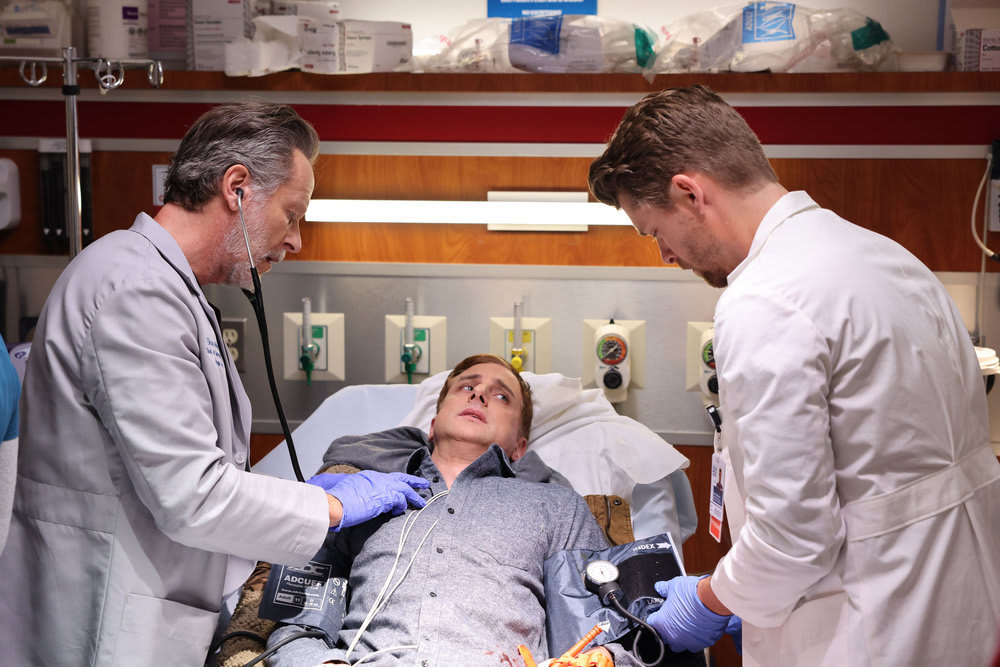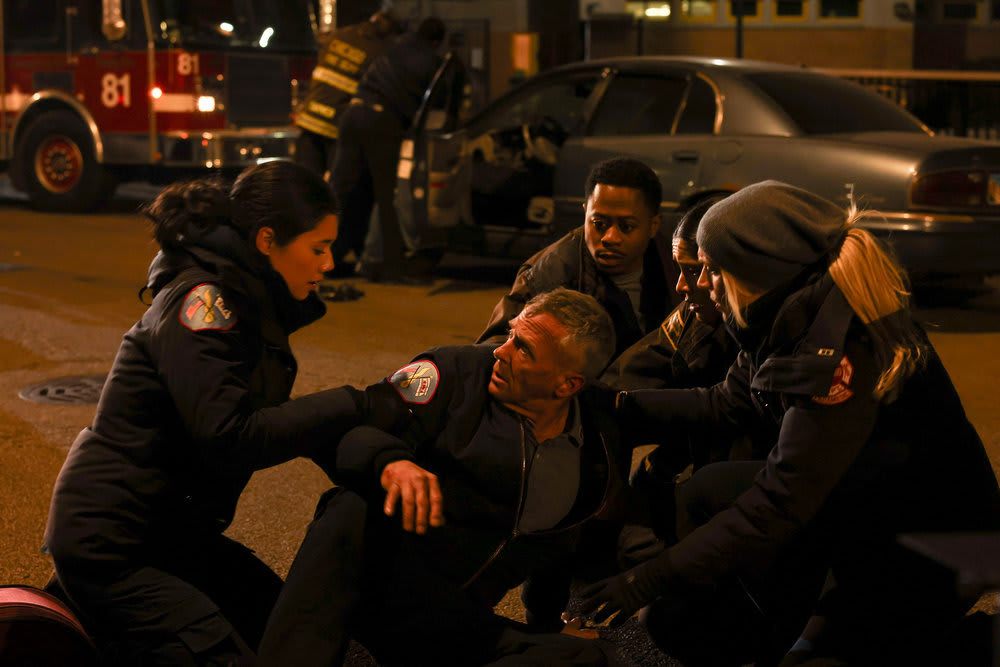TV viewers speak of a place called Chicago, a luckless city under weekly siege three times over, teeming with tidily resolved tragedy. In NBC’s small-screen franchise consisting of Chicago Med, Chicago Fire, and Chicago P.D., procedural emperor and net-worth billionaire Dick Wolf transplants the tried-and-true formulas of his tentpole Law and Order from New York to the Midwest, and the move requires minimal adjustment. The local texture amounts to little more than writers having Googled the correct street names—one mention of a “Chicago-style pothole” raises some questions about the unique properties of potholes—but that sameness is meant to be part of the appeal.
The Chicagoverse continues to dole out the simple pleasures of its eastward predecessors, pairing the satisfying step-by-step assembly for each colorful case of the week with soapier multi-episode personal arcs for the main ensembles. Over the past decade, all three programs have remained ratings juggernauts for their familiarity, hitting their beats so faithfully that nobody has to worry about getting lost or rankled. It all goes down smooth, the closest thing we have to easy-listening television.
Though, during Wednesday night’s triple season premiere, the more apt metaphor might have been the morning paper, a leisurely way for the offline to digest the developments of the world. All the best Law and Orders fall into the ripped-from-the-headlines category, laying a thin sheen of fiction on some specific real-life scandal. The latest openers for the Chicago triumvirate go a bit broader, rendering Big Topics of the now as potboiler entertainment. Only by drawing from the ever-updating present can a man simultaneously keep so many TV shows afloat for so many years, and Wolf’s fiefdom serves as a pretty good gauge for the network notion of qualified hipness, aware of what’s modern while maintaining a safe distance from its cutting edge.

Chicago Med.
NBC
Med tackled A.I. as its major theme last season with the introduction of “2.0,” a brand-spanking-new smart surgery tool prone to generating bad data. The message seemed clear—these doohickeys cannot be trusted, best left to lower-stakes applications—which made the Season 9 premiere’s seeming backpedal all the more confounding. In the A-plot, a massive pile-up floods the Gaffney Medical Center, forcing the staff to rely on 2.0 for a tricky operation, as if to walk back their stance to partial approval in the right situations. (Was this a note from the NBCUniversal Media brass, implemented during the inter-season hiatus?)
This effort to stay up-to-date on the most pressing debates in medicine also shapes Med’s B-plot, wherein psychiatry chief Dr. Charles (Oliver Platt) realizes he treated a newly arrived attending physician as an unstable child, cueing up a tête-à-tête on over-prescription and the controversial concept of “chemical restraints.” The dialogue launders talking points and counterpoints through the mouths of the actors, its blatant didacticism providing much to thoughtfully nod one’s head at.
The high point of any given Wolf-produced script comes when someone’s made to say, in plain language, what’s going on that week. Med gets a classic with the exchange of, “So you’re saying he’s internally decapitated?” “Yeah, the only thing holding his head on is his skin.” Fire attempts to match it with “Captain, I think there might be a serial arsonist targeting firefighters,” but comes up short on that front and in general. This series in particular has always been at a disadvantage among its siblings, as the act of firefighting is not as rooted in investigation as police work or medicine. This handicap has, however, demanded some amusing acrobatics to create suspense. (Who knew there were so many different kinds of fire?) In the instance of Wednesday's Season 12 opener, a disgruntled former firefighter starts sending chemical bombs to the ladder company that booted him all those years ago, which gives the gang cause to sniff out clues and construct theories.

True to form as the Chicago heaviest on tiresome character business to compensate for conceptual thinness, Fire back-burners the issue to focus on the return of sidelined fan favorite Mouch (Christian Stolte) after an injury last season, and the departure of Gallo (Alberto Rosende) to live with his aunt in Michigan. This was far from Fire’s finest hour, with the ratio of melodrama to goofy fire-sleuthing all out of whack—and yet still a step above the dour, derivative P.D., now in its eleventh season.
There’s little procedural kitsch to be savored in a grim murder case with a mental illness slant, which requires detective Hailey Upton (Tracy Spiridakos) to update her methods for an era of increased sensitivity. She bristles against the namby-pamby counsel of the Crisis Intervention Team leader she’s been assigned to shadow, only to come around on the efficacy of talking and listening over brute force by the hour’s end. Her problems with rage at work tie into her divorce back home, a narrative parallel that left a deeper impact when Christopher Meloni did it in Law and Order: Special Victims Unit’s seventh season. Mostly, the episode serves as a reminder that the American viewing public can watch a man shoot himself in the skull on network television, but cannot countenance the sight of an areola.

NUP_203202_00746.jpg
NBC
Special Victims Unit may no longer be NBC’s prize pig in terms of ratings, but it still holds the legacy slot on Thursday nights while Chicago sprawls across Wednesday. Perhaps that’s because SVU still represents Wolf’s writing squadron at the height of their powers, marrying a pulp-adjacent absurdity with the genuine chemistry of a cast that’s survived generations of turnover. In its time-honed stamina, SVU has developed the efficient competence of a veteran newsroom. In comparison, the Chicagoverse is closer to a content mill, a well-oiled machine, productive and mechanical. It gives its viewership a lot in the knowledge of how little we expect from it.
"TV" - Google News
January 19, 2024 at 02:16AM
https://ift.tt/4rDLitq
'Chicago Med,' 'Fire,' and 'P.D.' TV Review: NBC's Comfort Watches Are Back - The Daily Beast
"TV" - Google News
https://ift.tt/EuOn8yp
Bagikan Berita Ini














0 Response to "'Chicago Med,' 'Fire,' and 'P.D.' TV Review: NBC's Comfort Watches Are Back - The Daily Beast"
Post a Comment